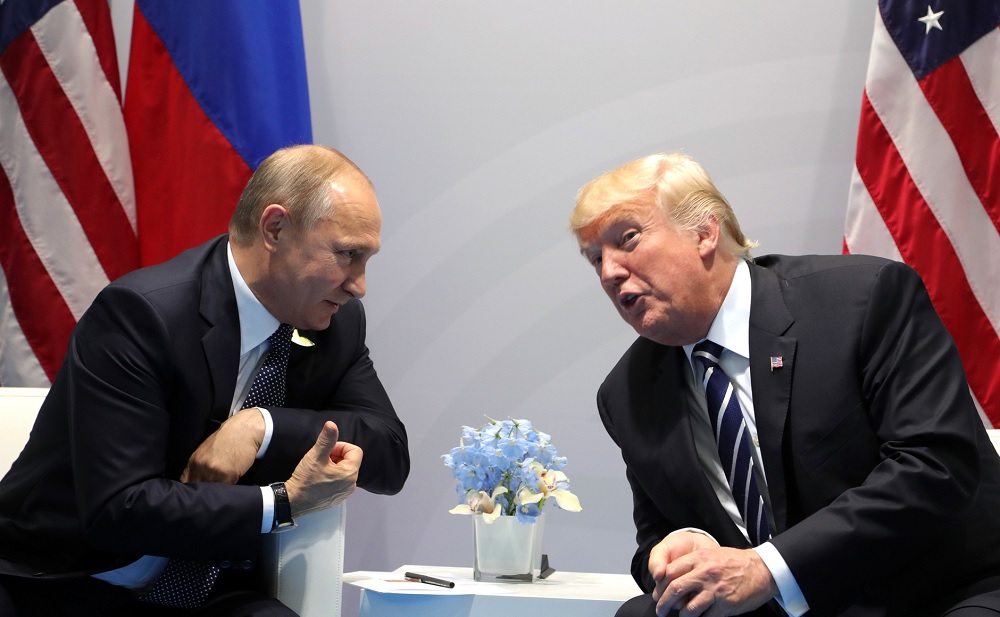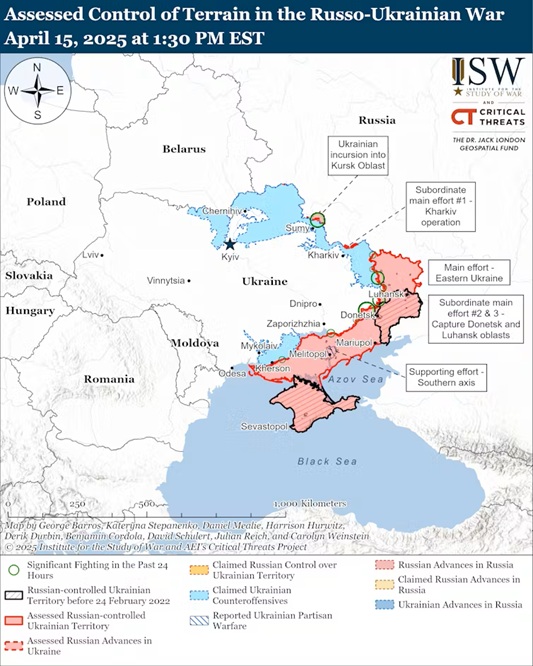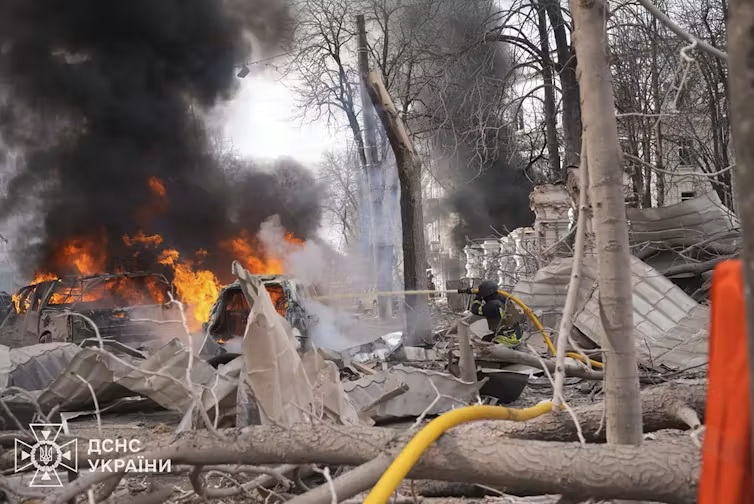Why is Donald Trump failing to bring peace to Ukraine like he promised?

Jennifer Mathers, Senior Lecturer in International Politics, Aberystwyth University
Ending Russia’s war in Ukraine was one of Donald Trump’s campaign promises, and one that he famously boasted could be achieved in 24 hours. But three months after taking office, the Trump administration has only managed to negotiate a partial ceasefire that has done nothing to stop the fighting.
On April 13, for example, Russia fired ballistic missiles into the city of Sumy in north-eastern Ukraine, killing at least 35 civilians gathered to celebrate Palm Sunday and injuring over 100 more.
Numerous meetings
Military attacks have continued despite numerous meetings between senior Russian and US officials, and phone conversations where Trump and his Russian counterpart, Vladimir Putin, have spoken directly.
So, why are Trump’s efforts to end the war struggling to get off the starting blocks? The most important reason is that Russia is blocking progress. Moscow has created obstacles, deployed delaying tactics and has generally muddied the waters.

Trump’s major initiative is his proposal for a 30-day general ceasefire to prepare the way for broader peace negotiations. While Ukraine’s president, Volodymyr Zelensky, agreed to this immediately when it was proposed in March, Putin did not. He instead offered a counter proposal: a partial ceasefire banning attacks on energy infrastructure.
Russia relies heavily on the export of energy, especially oil, to fund the war. But Ukraine has been systematically targeting Russia’s oil refineries and storage facilities, mainly using domestically produced drones. Ukraine is estimated to have destroyed 10% of Russia’s refining capacity since the beginning of 2025.
By narrowing the scope of the ceasefire, Putin was able to shield Russia’s energy production while continuing to attack Ukraine. Moscow needs the fighting to continue to achieve its openly stated goal of controlling all of Donetsk, Luhansk, Kherson and Zaporizhzhia, the four regions of Ukraine it claimed to annex in 2022.
Concessions
Another Russian tactic has been to take every opportunity to present a list of demands for Ukrainian concessions. These include Kyiv giving up its claims to Ukrainian territory occupied by Russia, abandoning its goal of joining Nato, and reducing its armed forces significantly. Russia also wants Ukraine to agree to a change of political leadership.
This tactic is important for two reasons. First, Russia’s demands make it clear that Moscow envisages the war as the first stage in a longer-term plan to exercise control over all of Ukraine, not only the annexed territories. And second, repeatedly stating Russia’s demands gets them into the public discourse.
When journalists – or, especially, US officials – repeat them, as Trump’s special envoy Steve Witkoff did recently, they gain an air of legitimacy. This creates the expectation that a peace agreement will comply with Moscow’s agenda.
Russia is also good at deflecting attention away from ending the war. Sometimes Putin does this with flattery and by appealing to Trump’s sense of self-importance.
In an interview about his March trip to Moscow, Witkoff glided over his failure to secure a pledge from the Russians to agree to a general ceasefire and instead conveyed a touching story demonstrating Putin’s regard for Trump.
Putin apparently told Witkoff that he went to church and prayed for Trump’s recovery after he narrowly escaped an assassination attempt during the election campaign. Putin also sent Witkoff back to the US with a portrait of Trump, painted by an artist who is known for producing flattering portraits of Putin himself.
Another effective tactic of deflection involves money. Russian officials dangle the prospect of lucrative deals involving trade and investment in front of Trump administration officials. This was evidently the focus of much of the first meeting between US and Russian officials in Saudi Arabia in February, although it was convened to discuss plans for peace.
It is also probably the reason for Kirill Dmitriev’s visit to Washington at the beginning of April. Dmitriev, a figure close to Putin and head of Russia’s sovereign wealth fund, confirmed to journalists that his discussions encompassed possible deals with the US involving rare-earth metals, exploiting resources in the Arctic, and resuming direct flights between the US and Russia.
Trump’s role
While Russia places obstacles in the path of peace, Trump and his officials do nothing to remove them. This allows Moscow to continue waging war without constraints.
Despite Trump’s occasional tough talk about running out of patience with Moscow, as well as his threats of secondary tariffs on countries that buy oil from Russia, no measures that would put pressure on Russia have been implemented.
Trump has instead made excuses for Moscow. He described the attack on Sumy as a “mistake”, and has expressed admiration for Putin for dragging his feet to get a better deal with Washington.

This contrasts sharply with Trump’s dealings with Ukraine. Zelensky was publicly humiliated during his meeting with Trump and US vice-president, J.D. Vance, in the Oval Office in February. Trump has even accused Zelensky of starting the war, which was launched by a mass invasion of Russian forces.
Trump and his team have shown far less interest in Ukraine’s security needs than in striking a lucrative deal to extract the country’s natural resources. The prospect of the Trump administration negotiating a peace agreement that the Ukrainians would accept seems remote.
So, where does this leave the peace process? When the partial ceasefire arrangement comes to an end later in April, Washington will have to decide whether to resume its efforts to secure a general ceasefire or chart a new course.
Based on his track record so far, Trump might just blame the Ukrainians for refusing to surrender to Russia’s terms, abandon attempts to reach a negotiated settlement to the war, and go straight to reestablishing normal relations with Russia.
This article was first published on The Conversation
![]()
Support our Nation today
For the price of a cup of coffee a month you can help us create an independent, not-for-profit, national news service for the people of Wales, by the people of Wales.






Conspiratorial leverage by allies…
The three headed monster Trwmp, Putin and Netanyahu… Top international criminals…The Grand Father, The Godfather and the Undertaker…
Trump’s a crooked business man, not a politician. I suspect the article is correct, Putin has dangled a rare minerals money making deal in front of Trump and Trump is eager to take it. Throw Ukraine to the wolf for it and blame the country for not compromising – by compromise I mean giving up the land Russia has already taken. If the US walks away the Ukrainians will probably have to give up that land and sue for peace. However, there is no reason why, once that peace has started – European troops be placed in Ukraine to keep… Read more »
Trump has failed miserably when it comes to standing up to Putin and Netanyahu!! Both of them show little regard for him and International Law. He himself has shown time and again that the Laws of the country Do NOT apply to him which encourages both of them to act with the same
disdain!!!
Because he has an exaggerated view of his own abilities, and is completely out his depth in geopolitics. He thinks you can run a country like a company: he’s wrong, but thinks he’s right.
You should probably let the Cons know this. They’ve been trying to get companies running the show for decades and all it’s left us with is failing infrastructure and services.
No-one has explained why letting Russia keep the captured land would end this. They already have more land than any other country in the world. If they want a buffer between them and NATO the only option is to hand the captured land to the UN to run so neither Russia nor Ukraine control it.
We all know it would not end it. The original plan was to take the whole of Ukraine and probably Moldova and at best make rump vassal states while incorporating the east and the south into Russia.
That plan would just be delayed.
Putin most likely has kompromat on trump.
Trump was never the wheeler dealer he made himself out to be.
This was never on the cards with trump. Day one he said. Alarm bells right there. Trump has already aligned with putin.
Trump admires money. Putin is rich. He admires power. Putin is a tyrant. Trump is now Putin’s Poodle…. Putin throws him a treat (like the rare earth minerals) and The Poodle goes chasing after it with his tongue hanging out. The Poodle gets his underlings to repeat Russian rhetoric across the media and Putin tells his Poodle what a good boy he is and how, if he’s a very good boy, he’ll then Papa Putin will show his Poodle how to get rich, stay in power and suppress the will of his own people too. It’s sickening…..but the article is… Read more »